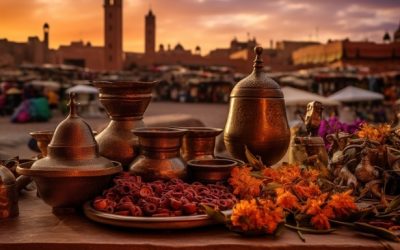Geography and Location of Agadir
Agadir is a vibrant port city located on the southwestern coast of Morocco. Known for its stunning beaches and mild climate, it sits along the Atlantic Ocean, making it a key maritime hub in the region. Its strategic position between the Atlas Mountains and the ocean offers unique geographic features that attract both tourists and traders. The city’s location provides a blend of natural beauty and economic importance within Morocco.
Geographical Setting
Agadir is a prominent city located in the southwestern part of Morocco, along the Atlantic Ocean coastline. It is renowned for its vibrant port, extensive beaches, and strategic geographical position which makes it an important economic and tourist hub in the region.
- Geographical Setting: Agadir is situated on a low-lying coastal plain at the foot of the Anti-Atlas Mountains, providing a scenic backdrop and favorable climate conditions.
- Coordinates: Approximately 30.4278° N latitude and 9.5986° W longitude.
- Climate: The city experiences a semi-arid climate with mild, rainy winters and hot, dry summers, influenced by its proximity to the Atlantic Ocean.
- Topography: The area is characterized by a largely flat coastal plains with surrounding hills and the nearby Anti-Atlas mountain range.
- Accessibility: Located around 250 kilometers southwest of Marrakech, Agadir benefits from good road connections and a modern airport, facilitating domestic and international travel.
Climate and Weather Conditions
Agadir is a coastal city located in the southwestern part of Morocco, situated along the Atlantic Ocean. It is known for its strategic position between the Atlas Mountains and the ocean, making it a key port and popular tourist destination. The city is approximately 508 kilometers southwest of Casablanca and about 235 kilometers south of Marrakech.
The climate of Agadir is characterized as Mediterranean with a semi-arid influence. It enjoys warm, sunny weather for most of the year, which makes it ideal for beachgoers and outdoor activities. The city experiences mild, wet winters and hot, dry summers. Its location provides a relatively moderate temperature range due to the maritime influence.
- Summer temperatures often range from 25°C to 30°C (77°F to 86°F).
- Winter temperatures typically stay between 12°C and 20°C (54°F to 68°F).
- The city receives limited rainfall, mostly during the winter months, with an annual average of around 300 millimeters.
- Sea breezes and ocean currents help maintain moderate temperatures and influence the local weather patterns.
Proximity to Major Landmarks
Agadir is a prominent city located on the southwestern coast of Morocco, along the Atlantic Ocean. Situated within the Souss-Massa region, it boasts a strategic position that offers stunning views of the ocean and easy access to maritime activities. The city is well-known for its expansive beaches, vibrant port, and modern infrastructure, making it a key economic and tourist hub in the country.
Agadir is approximately 507 kilometers south of Casablanca and about 235 kilometers southeast of Marrakech, making it accessible for visitors traveling between major cities. The city is also close to notable landmarks such as the Anti-Atlas Mountains to the south and the Sahara Desert to the east, providing diverse landscapes for exploration. The nearby Souss-Massa National Park and the Agadir Oufella ruins are significant sites that highlight the region’s natural and historical importance.
Historical Background of Agadir
Agadir, a vibrant city located along Morocco’s southern coast, boasts a rich historical background shaped by its strategic location and diverse cultural influences. Originally a small fishing village, Agadir rose to prominence as a key port and commercial hub over centuries. The city experienced a devastating earthquake in 1960, which led to its near-total destruction and subsequent modern reconstruction. Today, Agadir blends its storied past with contemporary development, making it a unique destination that reflects Morocco’s historical resilience and cultural diversity.
Origins and Early History
Agadir, a major city located in southwestern Morocco, has a rich historical background rooted in ancient Berber civilization. Its origins can be traced back to the early settlements established by Berber tribes who inhabited the Atlantic coastal region. The area was historically significant due to its strategic location along trade routes linking sub-Saharan Africa, the Mediterranean, and the Atlantic Ocean.
During the medieval period, Agadir served as a vital port and trading hub, facilitating commerce between different cultural and economic regions. The city and its surrounding areas saw the influence of various dynasties, including the Almoravids and Almohads, who contributed to its development as a thriving center for trade and maritime activity. The early history of Agadir reflects its importance as a crossroads of civilizations, shaped by indigenous Berber communities and external powers over centuries.
Major Historical Events
Agadir, a major port city in southwestern Morocco, has a rich historical background shaped by its strategic location along the Atlantic coast. It was originally a Berber fishing village before gaining prominence as a vital trading hub. The city’s modern development was significantly influenced by its reconstruction after a devastating earthquake in 1960, which destroyed much of its old infrastructure.
One of the most significant historical events in Agadir’s history is the 1960 earthquake, often referred to as the Agadir Earthquake. It struck on February 29, 1960, with a magnitude of 5.7 but resulted in extensive destruction and loss of life, prompting massive rebuilding efforts that modernized the city. This disaster led to both economic and social transformations, shaping Agadir into a contemporary urban center.
Throughout its history, Agadir has also played an essential role in regional trade and maritime activities, benefiting from its natural harbor. The city was involved in various historical periods, including the influence of Portuguese explorers in the 15th century and its development under Moroccan sovereignty. Today, Agadir is known for its tourism, agricultural products, and vibrant port economy, reflecting its enduring historical significance.
Reconstruction after the 1960 Earthquake
Agadir, a port city in southwestern Morocco, has a rich history that dates back centuries. It was originally a small fishing village before evolving into an important commercial center due to its strategic location on the Atlantic coast. The city’s growth was further propelled by its role in trade and maritime activities. In the early 20th century, Agadir attracted attention due to its importance in regional affairs, but its most significant historical event occurred in 1960 when a devastating earthquake struck the region.
The 1960 Earthquake of Agadir was a catastrophic event that resulted in the loss of thousands of lives and widespread destruction of infrastructure. The earthquake measured approximately 5.7 magnitude but caused immense damage to the city’s buildings and homes. The devastation prompted a massive reconstruction effort led by the Moroccan government and supported by international aid. The reconstruction process involved rebuilding not only the physical structures but also modernizing the city’s urban planning and infrastructure, which transformed Agadir into a more resilient and developed metropolis.
Post-earthquake reconstruction focused on implementing seismic-resistant building techniques and expanding urban facilities to accommodate future growth. The city was redesigned with wider streets, better drainage systems, and improved public services to prevent similar disasters in the future. Additionally, this period marked a shift towards promoting tourism and economic development, helping Agadir regain its prominence as a key port and resort destination. Today, Agadir stands as a symbol of recovery and resilience, blending its historical roots with modern advancements.
Culture and Traditions
Agadir, Morocco, is a vibrant city rich in culture and traditions that reflect its unique history and diverse influences. The local customs, festivals, and everyday practices provide a deep insight into the heart of Moroccan life. Exploring Agadir’s cultural landscape reveals a captivating blend of ancient traditions and modern developments, making it a fascinating destination for those interested in authentic Moroccan heritage.
Local Cuisine
Agadir, Morocco, is a vibrant city rich in culture and traditions that reflect its unique history and diverse influences. The city is known for its warm hospitality, colorful festivals, and traditional music and dance that keep its cultural heritage alive. Locals celebrate events like the couscous festival and Ramadan with enthusiasm, showcasing their deep-rooted customs. The architecture and crafts, including pottery and textiles, further highlight the city’s artistic legacy.
Agadir’s local cuisine offers a delectable blend of flavors influenced by Moroccan and Berber culinary traditions. Fresh seafood from the Atlantic is a staple, often prepared with traditional spices and herbs. Tagines, a slow-cooked stew of meat and vegetables, are commonly enjoyed, along with couscous served with vegetables and meat. Mint tea and Moroccan pastries like baklava add to the culinary experience, providing a taste of the city’s warm and welcoming culture.
Traditional Music and Dance
Agadir, a vibrant city located on the southern coast of Morocco, boasts a rich tapestry of culture and traditions that reflect its diverse history and diverse inhabitants. The city is renowned for its unique blend of Berber, Arab, and European influences, which are evident in its music, dance, and cultural practices. These traditions play a vital role in preserving the identity of Agadir and offering visitors an authentic experience of Moroccan heritage.
- Traditional Music: Agadir is known for its lively and rhythmic music styles, including “Ahwash,” a communal Berber dance accompanied by singing and drumming. The city also celebrates Gnawa music, characterized by hypnotic melodies and spiritual themes that have deep roots in North African culture.
- Dance Forms: The traditional dances in Agadir often involve group performances with synchronized movements, showcasing unity and cultural pride. The “Ahwash” dance features circular formations with rhythmic clapping and singing, while other folk dances are performed during festivals and celebrations.
- Cultural Festivals: Annual events like the Timitar Music Festival highlight Agadir’s musical diversity, where local artists perform alongside international musicians, celebrating cultural exchange and tradition.
- Traditional Attire: During festivals and special occasions, people wear traditional Moroccan clothing, such as the “Djellaba” and “Kaftan,” which reflect the city’s cultural heritage and craftsmanship.
Crafts and Souvenirs
Agadir, Morocco, is a vibrant city known for its rich culture and deep-rooted traditions that reflect a blend of Berber, Arab, and French influences. The city’s cultural scenes showcase lively music, dance, and festivals that celebrate its history and diverse heritage. Traditional Moroccan cuisine also plays a significant role, highlighting flavors unique to the region and its culinary arts. Visitors can immerse themselves in local customs by participating in community events that preserve age-old practices passed down through generations.
Craftsmanship is an integral part of Agadir’s identity, with artisans creating stunning works from leather, ceramics, and textiles. Local markets, or souks, are filled with handmade crafts and souvenirs that serve as authentic mementos of the city. Items such as intricately woven carpets, traditional jewelry, and colorful pottery are popular among tourists seeking to take a piece of Agadir home. These crafts not only showcase the skill of local artisans but also help sustain traditional techniques and cultural expressions within the community.
Tourist Attractions in Agadir
Agadir, a vibrant city located along the Atlantic coast of Morocco, is renowned for its stunning beaches, rich culture, and diverse array of attractions. Visitors can explore the lively markets, historic landmarks, and scenic coastal landscapes that make Agadir a popular destination for travelers seeking both relaxation and adventure. With its warm climate and welcoming atmosphere, Agadir offers a memorable experience for all who visit.
Agadir Beach and Promenade
Agadir, Morocco, is renowned for its stunning tourist attractions, offering visitors a perfect blend of natural beauty and vibrant culture. One of the most popular destinations is Agadir Beach, a sprawling stretch of golden sand where travelers can relax, swim, or try water sports like surfing and jet skiing.
Along the coastline, the Promenade provides a lively and scenic walkway ideal for strolling, biking, or enjoying outdoor cafes. Lined with shops, restaurants, and entertainment options, the Promenade offers stunning views of the Atlantic Ocean and a chance to experience Agadir’s lively atmosphere. It is a favorite spot for both relaxing leisure activities and witnessing the city’s colorful sunsets.
Kasbah of Agadir Oufella
The Kasbah of Agadir Oufella is a historic fortress located atop a hill overlooking the city of Agadir, Morocco. It offers visitors stunning panoramic views of the coastal city and the Atlantic Ocean beyond. The Kasbah dates back to the 16th century and was built to protect the region from invasions and attacks. Despite being partially damaged during the 1960 earthquake, it remains a prominent tourist attraction that provides insight into Agadir’s rich history and strategic importance. Visitors can explore the ancient ramparts, enjoy the scenic vistas, and learn about the city’s past through local guides. The site is especially popular for breathtaking sunsets and photography, making it a must-visit spot for those interested in history and spectacular vistas in Agadir.
Souk El Had and Local Markets
Agadir, Morocco, is a vibrant city known for its stunning beaches, lively markets, and rich cultural experiences. Visitors can explore a variety of tourist attractions that showcase both its modern appeal and traditional heritage. The city’s impressive Agadir Kasbah offers panoramic views of the coastline and hosts historical sites that tell the story of its past. The beautiful Agadir Beach is perfect for relaxation, water sports, and enjoying the warm Moroccan sun.
Souk El Had is a bustling market in Agadir that provides an authentic shopping experience. It is the perfect place to browse through a wide array of Moroccan products, including textiles, spices, handicrafts, and jewelry. The lively atmosphere of Souk El Had allows visitors to immerse themselves in the local culture and find unique souvenirs to take home.
For those interested in exploring local markets, Agadir offers many traditional markets that reflect the city’s vibrant soul. These markets are ideal for experiencing Moroccan daily life, tasting local cuisine, and purchasing fresh produce, traditional clothing, and handcrafted items. The lively stalls and welcoming vendors create an unforgettable shopping adventure for tourists eager to discover the warmth and diversity of Agadir’s local culture.
National Park of Souss-Massa
Agadir, Morocco, is renowned for its stunning coastal scenery and vibrant culture, making it a popular tourist destination. One of the must-visit attractions in the area is the National Park of Souss-Massa, a protected area that boasts diverse ecosystems, including beaches, dunes, and wetlands. Visitors can enjoy birdwatching, spotting species such as flamingos and ospreys, and explore the unique flora and fauna native to the region. The park provides a tranquil escape into nature and offers opportunities for hiking, photography, and eco-tourism. Additionally, Agadir’s lively beaches, bustling souks, and modern resorts complement the natural beauty of the Souss-Massa National Park, making the city a perfect blend of relaxation and adventure for travelers.
Economy and Industry
Agadir, a vibrant city located along Morocco’s Atlantic coast, boasts a dynamic economy driven primarily by tourism, agriculture, and industry. Its strategic location and natural resources have fostered the growth of various sectors, making it an important economic hub in the region. The city’s diverse economy reflects its importance as a center for trade, manufacturing, and cultural exchange, contributing significantly to Morocco’s overall development.
Tourism Industry
Agadir, Morocco, has experienced significant growth in its economy and industry, driven largely by the tourism sector. Its strategic location along the Atlantic coast makes it a prime destination for both domestic and international visitors, contributing substantially to the local economy. The city has diversified its economy beyond tourism, embracing sectors such as agriculture, fishing, and manufacturing to sustain long-term growth.
The tourism industry in Agadir is a cornerstone of its economic development. Known for its beautiful beaches, modern resorts, and vibrant cultural scene, Agadir attracts millions of tourists each year. This influx of visitors supports numerous businesses, including hotels, restaurants, and entertainment venues, creating employment opportunities and stimulating local commerce.
- Agadir’s economy benefits from a robust hospitality and service industry centered around tourism.
- The city hosts various cultural festivals and sporting events that further attract tourists.
- Investments in infrastructure, such as new airports and roads, continue to enhance accessibility for travelers.
- Agricultural products, especially citrus fruits and seafood, play a significant role in local exports.
- Manufacturing and export industries, including textiles and crafts, are gradually expanding in the region.
Agriculture and Fishing
Agadir, Morocco, is a city renowned for its diverse economy, which balances industry, agriculture, and fishing. As a major port and commercial hub, Agadir benefits from its strategic location along the Atlantic Ocean, fostering vibrant economic activities.
In the realm of industry, Agadir hosts various manufacturing enterprises, including food processing, textiles, and construction materials. The city’s infrastructure supports export activities, contributing significantly to the regional economy.
Agriculture plays a vital role in Agadir’s economy, with the region known for its agricultural productivity due to favorable climate conditions. Key products include cereals, fruits, and vegetables, which are cultivated for both local consumption and export markets.
Fishing is an essential sector in Agadir, leveraging its extensive coastline along the Atlantic Ocean. The city boasts one of Morocco’s most active fishing ports, supplying a variety of seafood such as sardines, anchovies, and other fish species. The fishing industry sustains local livelihoods and sustains Morocco’s export demands.
Manufacturing and Commerce
Agadir, Morocco, stands out as a vital hub for the country’s economy and industry, significantly contributing to its manufacturing and commerce sectors. The city has developed a robust economic landscape driven by its strategic location along the Atlantic coast, facilitating international trade and export activities. Agadir’s port is one of the busiest in Morocco, supporting the transportation of goods such as agricultural products, fishery resources, and textiles. The manufacturing industry in Agadir includes food processing, particularly seafood and agricultural goods, as well as construction materials and furniture production, which serve both domestic and export markets. Additionally, Agadir’s thriving market infrastructure, including markets and commercial centers, fosters vibrant commerce. The city’s economic growth is further supported by investments in infrastructure, tourism, and sustainable development initiatives, reinforcing its role as an economic powerhouse in southern Morocco.
Transportation and Accessibility
Transportation and accessibility are vital components that shape the connectivity and ease of movement within Agadir, Morocco. As a popular tourist destination and economic hub, Agadir offers diverse transportation options that facilitate local travel and international access. Understanding the city’s transportation infrastructure and accessibility features helps visitors and residents navigate efficiently and enjoy all that Agadir has to offer.
Major Roads and Transportation Hub
Agadir, Morocco, boasts a well-developed transportation network that facilitates easy movement within the city and connects it to other major regions. The city is served by a key transportation hub, providing integrated services including bus, taxi, and railway options, making commuting convenient for residents and visitors alike. Major roads such as the Avenue Mohamed V and the N1 highway play a crucial role in linking Agadir to surrounding cities and national highways, ensuring smooth flow of traffic and accessibility. The transportation infrastructure is continually improving, supporting tourism, commerce, and daily life, and making Agadir a vital gateway for travelers heading toward the Atlantic coast and beyond.
Agadir Al Massira Airport
Agadir Al Massira Airport is a vital transportation hub serving the city of Agadir and the surrounding region in Morocco. The airport offers excellent accessibility for travelers arriving from various international destinations, making it a convenient gateway to the popular Moroccan tourist destination.
Located approximately 20 kilometers southeast of Agadir city center, the airport is well-connected through a range of transportation options. Taxis are readily available outside the terminal, providing quick and comfortable transport to the city or nearby resorts. Additionally, car rental services are accessible to travelers looking to explore the region at their own pace.
Public transportation options, including bus services, also link the airport to Agadir and other parts of the city, ensuring affordable and reliable access for all passengers. The airport’s modern facilities are designed to accommodate travelers with various mobility needs, offering services such as assistance for disabled passengers and accessible pathways, ensuring that everyone can easily reach their destinations.
Overall, Agadir Al Massira Airport provides seamless transportation and excellent accessibility options, facilitating smooth travel experiences for both domestic and international visitors to Agadir in Morocco.
Public Transit and Local Transport
Agadir, Morocco, offers a variety of transportation options that enhance accessibility and mobility within the city and its surroundings. The city has a well-developed public transit system that caters to both residents and visitors, making it easy to navigate without the need for a private vehicle.
The primary mode of public transit in Agadir is the bus system, operated by the local transportation authorities. These buses connect key neighborhoods, commercial centers, and tourist attractions, providing affordable and reliable transportation. Additionally, shared taxis and petit taxis are widely available for shorter trips and offer flexibility for travelers moving within the city.
Agadir’s urban infrastructure is designed to promote easy access for all residents, including those with mobility challenges. The city has prioritized pedestrian-friendly pathways and accessible transport stops, ensuring safe and convenient movement throughout the city. Moreover, the recent development of bike lanes encourages eco-friendly modes of transportation, catering to environmentally conscious commuters.
For visitors exploring beyond Agadir, regional train services and car rental options are available, providing convenient access to nearby destinations such as the Souss Valley and the Atlas Mountains. Overall, Agadir’s transportation network supports both daily commuting needs and tourism, making the city a accessible and welcoming destination for all.
Accommodation and Hospitality
Agadir, Morocco, is a popular destination known for its warm climate, sandy beaches, and vibrant culture. Its thriving accommodation and hospitality industry caters to a wide range of travelers, from luxury seekers to budget-conscious visitors. With a variety of hotels, resorts, hostels, and guesthouses, Agadir offers comfortable and welcoming options that ensure a memorable stay amidst the city’s stunning landscapes and lively atmosphere.
Hotels and Resorts
Agadir, Morocco, is renowned for its vibrant accommodation and hospitality industry, offering a wide range of hotels and resorts to suit every traveler’s preferences. The city’s beachfront location makes it a popular destination for those seeking relaxation, luxury, and cultural experiences. Visitors can enjoy world-class amenities, stunning ocean views, and warm Moroccan hospitality in many of the establishments lining the Agadir coastline.
Luxury resorts in Agadir often feature spacious rooms, private pools, spa services, and fine dining options, providing a perfect setting for both leisure and business travelers. Mid-range hotels offer comfort and convenience with modern facilities and proximity to major attractions, while budget accommodations ensure affordable stays without sacrificing quality. Many hotels also provide tailored services such as excursions, local cuisine, and cultural activities to enrich the guest experience.
Overall, Agadir’s hotels and resorts are known for their welcoming atmosphere, high standards of service, and beautiful settings, making it an ideal destination for anyone looking to explore Morocco’s southern coast and enjoy a memorable stay by the Atlantic Ocean.
Guest Houses and Budget Lodging
Agadir, Morocco, is a popular travel destination known for its beautiful beaches, vibrant culture, and modern amenities. Visitors seeking accommodation and hospitality options can choose from a variety of guest houses and budget lodgings that offer comfort without breaking the bank. These options provide an authentic Moroccan experience while ensuring budget-friendly stays for travelers of all ages and preferences.
- Guest Houses: Agadir features numerous guest houses that offer a cozy and welcoming environment. These establishments often include local decor and personalized service, giving guests a taste of traditional Moroccan hospitality.
- Budget Hotels: There are several budget hotels in Agadir providing clean, comfortable rooms with essential amenities such as Wi-Fi, air conditioning, and nearby access to beaches and city attractions.
- Hostels and Shared Accommodation: For travelers looking to meet others, hostels and shared lodgings offer affordable rates and a social atmosphere. Many hostels in Agadir have communal spaces and organized activities.
- Location Considerations: Most affordable accommodations are located close to popular beaches, the city center, or markets, making it easy for guests to explore Agadir on foot or via public transport.
Tourist Services and Facilities
Agadir, Morocco, is a vibrant tourist destination renowned for its welcoming accommodation and hospitality services. Visitors can choose from a wide range of hotels, resorts, and guesthouses that cater to various budgets and preferences. The city boasts modern amenities, comfortable rooms, and exceptional service, ensuring a pleasant stay for all travelers. Additionally, Agadir offers an array of tourist services and facilities, including tour operators, car rentals, and information centers that help visitors explore the region effectively.
The city’s beaches are well-equipped with facilities such as sunbeds, umbrellas, and water sports rentals, making it easy for tourists to enjoy the sun and sea. Agadir’s bustling souks and shopping districts provide diverse local products, handicrafts, and souvenirs, supported by efficient market services. Culinary enthusiasts can indulge in a variety of dining options, from traditional Moroccan cuisine to international dishes, served in a range of restaurants and cafes. Overall, Agadir combines excellent accommodation options with comprehensive tourist services, making it a top choice for travelers seeking relaxation and adventure in Morocco.
Local Events and Festivals
Agadir, Morocco, is a vibrant city known for its rich cultural heritage and lively community spirit. Throughout the year, it hosts an array of local events and festivals that showcase the region’s traditions, music, and cuisine. These celebrations provide visitors and residents alike with an immersive experience into the authentic Moroccan lifestyle, making Agadir a dynamic destination for cultural enthusiasts.
Timitar Music Festival
The Timitar Music Festival in Agadir, Morocco, is a vibrant celebration that highlights the rich musical heritage of the region and beyond. Held annually, this festival brings together diverse artists from around the world, blending traditional Amazigh sounds with contemporary genres to create a unique cultural experience.
Located in the coastal city of Agadir, the festival offers an exciting lineup of performances on multiple stages, attracting both locals and international visitors. Besides music, Timitar features cultural workshops, art exhibitions, and street performances, making it a lively event that showcases Morocco’s cultural diversity.
The festival’s setting in Agadir, with its beautiful beaches and warm climate, provides an ideal backdrop for this celebration of music and culture. It serves as an important platform for promoting Moroccan identity, fostering intercultural dialogue, and supporting local artists and artisans.

Agadir International Marathon
The Agadir International Marathon is a prominent annual event that attracts runners and spectators from around the world to the vibrant city of Agadir, Morocco. Celebrated for its scenic coastal views and accueillant atmosphere, the marathon showcases the beauty of Agadir’s waterfront and lush landscapes. Participants have the opportunity to experience the warmth of Moroccan hospitality while competing in a well-organized race that promotes health, fitness, and cultural exchange.
Held typically in the spring, the Agadir International Marathon features various race categories, including full marathons, half-marathons, and fun runs, catering to people of all ages and skill levels. The event also includes cultural activities, local music performances, and traditional Moroccan cuisine, making it a festive occasion for both participants and spectators. The marathon not only highlights Agadir’s natural beauty but also emphasizes its status as a hub for sports tourism and cultural diversity in Morocco.
Cultural and Religious Celebrations
Agadir, Morocco, is a vibrant city renowned for its lively local events, festivals, and cultural celebrations that showcase the rich heritage of the region. Throughout the year, residents and visitors alike participate in a variety of traditional festivals that highlight Moroccan customs, music, dance, and cuisine. These gatherings foster community spirit and offer a unique glimpse into Berber, Arab, and Amazigh cultures.
One of the most prominent celebrations in Agadir is the citrus festival, held annually to honor the region’s abundant citrus farms. During this event, there are parades, music performances, and the showcasing of delicious citrus-based products. Another important festival is the Timitar Music Festival, which attracts international and local artists, emphasizing the diverse musical traditions of Morocco, including Amazigh, Andalusian, and Moroccan pop music.
Religious celebrations also hold significant importance in Agadir. Ramadan is observed with nightly gatherings, special prayers, and shared meals, creating opportunities for community bonding. Eid al-Fitr and Eid al-Adha are celebrated with festive prayers, feasts, and the giving of gifts, reflecting deep-rooted Islamic traditions. Additionally, the Amazigh New Year, Yennayer, is celebrated with traditional dances, music, and the preparation of special dishes, emphasizing the city’s rich Berber heritage.
These events and festivities in Agadir provide an authentic experience of Moroccan culture and highlight the city’s role as a hub of tradition and celebration. They offer a vivid tapestry of history, religion, and social life, making Agadir a captivating destination for those interested in exploring Morocco’s diverse cultural landscape.





0 Comments